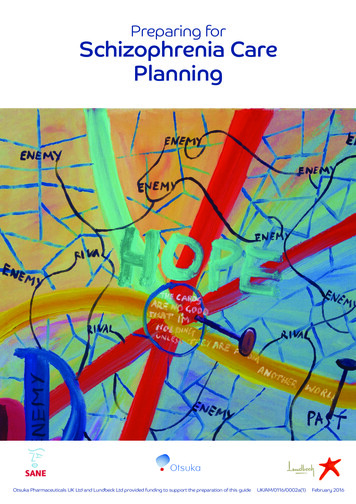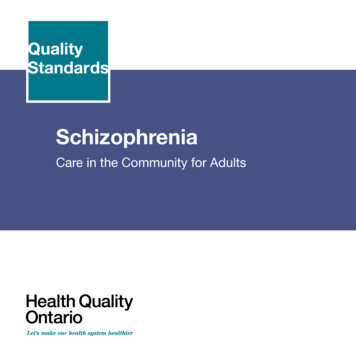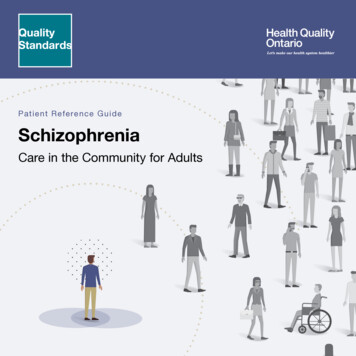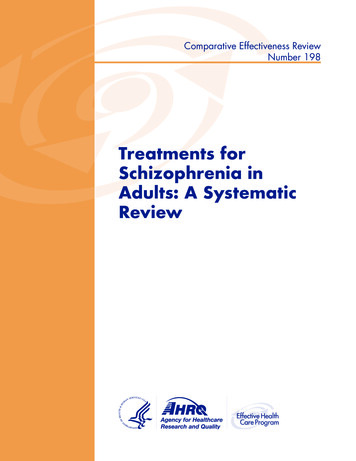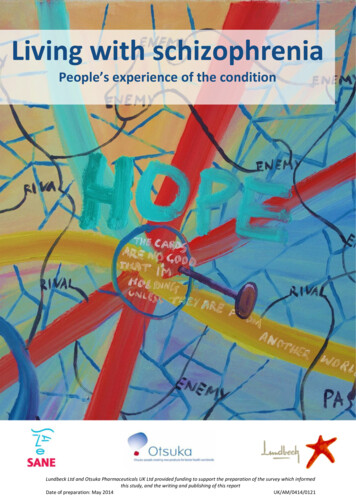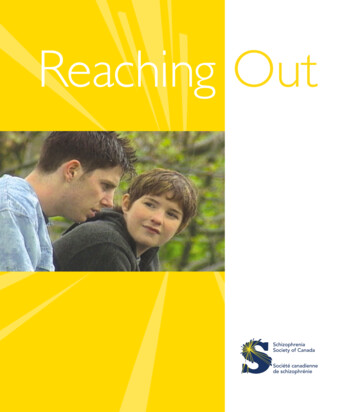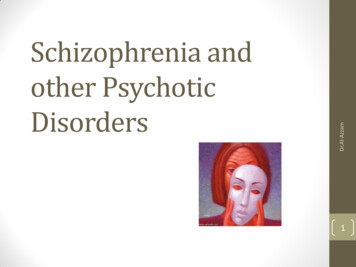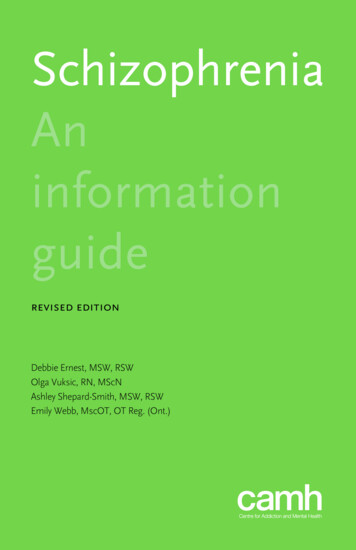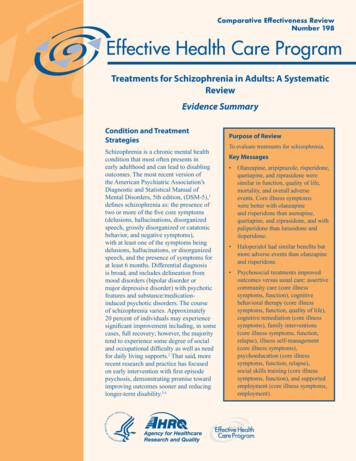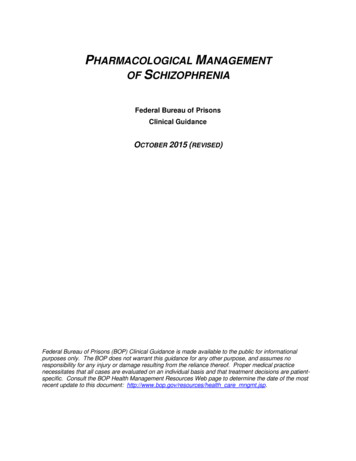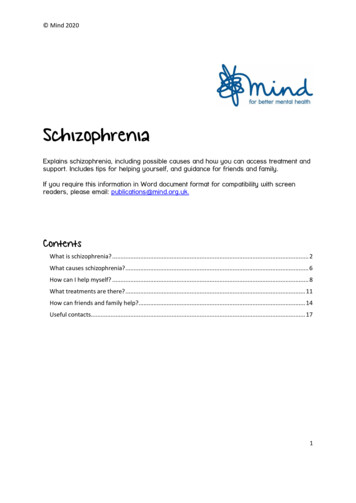
Transcription
Mind 2020SchizophreniaExplains schizophrenia, including possible causes and how you can access treatment andsupport. Includes tips for helping yourself, and guidance for friends and family.If you require this information in Word document format for compatibility with screenreaders, please email: publications@mind.org.uk.ContentsWhat is schizophrenia? . 2What causes schizophrenia? . 6How can I help myself? . 8What treatments are there? . 11How can friends and family help?. 14Useful contacts. 171
Mind 2020What is schizophrenia?Schizophrenia is a complicated mental health problem related to psychosis. There's lots ofmisconceptions about it. Even mental health professionals don't all agree about it. But thereality is that about 1 in every 100 people get this diagnosis at some point in their life.This section covers: Symptoms of schizophrenia Diagnosis and misdiagnosis Misconceptions about schizophreniaSymptoms of schizophreniaMany experiences and behaviours can be part of schizophrenia. They can start suddenly,or they might develop gradually over time.Each person's experience is unique. A doctor might suggest you have schizophrenia ifyou experience some of the following: a lack of interest in things feeling disconnected from your emotions difficulty concentrating wanting to avoid people hallucinations, such as hearing voices or seeing things others don't delusions (strong beliefs that others don't share), including paranoid delusions disorganised thinking and speech not wanting to look after yourself.Hallucinations and delusions are types of psychosis."I have bizarre delusions which include psychic battles in which peoplearound me can be perceived as either 'good' or 'evil'. Sometimes I am in adifferent time zone or move between periods of history in different lives."You might also find that you: aren't able to carry on with day-to-day activities, like going to work or taking careof yourself2
Mind 2020 become upset, confused or suspicious of other people or particular groups (likestrangers, or people in authority) disagree with people who think something is wrong feel worried or afraid of seeking help."Sometimes I feel thoughts are being put in my head and that people arereading my thoughts."Positive and negative symptomsProfessionals sometimes talk about schizophrenia symptoms as being 'positive' and'negative'. But this doesn't mean 'good' or 'bad'. Positive symptoms are experiences or behaviours that the condition adds to yourlife. Like hearing or seeing things that others don't, or having a belief thatsomething is real or true when it isn't. Negative symptoms are experiences or behaviours that the condition takes awayfrom your life. Like finding things less interesting or enjoyable, moving your bodyless, or having less motivation.Diagnosis and misdiagnosisDiagnosing schizophrenia is complicated - there's no straightforward test for it. And viewson this diagnosis have been changing over the years. Many people think that it mayactually be several overlapping conditions, rather than one single condition.If you're experiencing symptoms, it's a good idea to start by talking to your doctor. Theymay refer you to a mental health specialist, who can assess you by asking you questions.Most people diagnosed with schizophrenia are aged between 18 and 35.Read more about how mental health problems are diagnosed.Issues with the term 'schizophreniaSome people argue that because there isn't a clear definition of schizophrenia, doctorsshouldn't use this term at all. Especially because this diagnosis can feel stigmatising.Others think that the name of the condition doesn't matter - what matters more is findingways to help people with their individual symptoms and needs.If you've been given this diagnosis, it might help to think of it as a tool for treating whatyou're currently experiencing. Not as a definite condition or label that you will have to livewith forever.3
Mind 2020Conditions with similar symptoms to schizophreniaThere are also several other conditions that share many of the same symptoms ofschizophrenia. These include: schizoaffective disorder some types of personality disorders (specifically schizotypal and schizoidpersonality disorder) bipolar disorder.It's also possible to experience an episode of psychosis (one of the most commonsymptoms of schizophrenia) without having any particular condition.So doctors might find it hard to decide which diagnosis best fits your specific experiences.It's also possible to have more than one diagnosis at once.What to do if you disagree with your diagnosisIf you're worried that your schizophrenia diagnosis doesn't match how you feel, it'simportant to discuss it with your mental health team.If you're not happy with how you're being treated, you can complain about health andsocial care. Or there are steps you can take if you feel that the details in your medicalrecords are wrong.See our information on seeking help for a mental health problem and advocacy for moreinformation on how to make sure your voice is heard and what you can do if you're nothappy with your doctor or diagnosis."What was real and what was not? I couldn't tell the difference any longerand it was exhausting."Inequality and discriminationAbout one in every 100 people is diagnosed with schizophrenia. It seems to affect roughlythe same number of men and women. Most people diagnosed with schizophrenia areaged between 18 and 35, with men tending to get a diagnosis at a slightly younger agethan women.Black people in the UK are far more likely to be diagnosed with schizophrenia thanpeople of other ethnicities. But there's no evidence that being Black makes youbiologically more vulnerable to it. And up until 11 years old, Black children don't havepoorer mental health than others of their age.4
Mind 2020The explanation for this might be to do with: Differences in life experiences. Black people in the UK are more likely toexperience things like discrimination, racism, social deprivation and migration(having to move home to a totally new place or culture). These kinds of highlystressful life experiences may trigger schizophrenia. Discrimination in the healthcare system. Psychiatrists with very different cultural,social or religious experiences to their Black patients may misdiagnoseschizophrenia more often.Mind is working to remove inequality of opportunity in the mental health sector. Readabout our equality work and our campaigning work. You can campaign with us for afairer system."More recently my symptoms have included voices outside my head,feelings that people are talking about me and spying on me."Misconceptions about schizophreniaThere's more misinformation in the media about schizophrenia than about any other typeof mental health problem. Stories in the news and on TV shows are often sensationalisedand misleading.The truth is: It does not mean someone has a 'split personality'. These experiences are moreassociated with dissociative identity disorder. It does not make someone dangerous or violent. There is no evidence thatschizophrenia itself causes violence. People with this diagnosis are much morelikely to harm themselves than to harm someone else. There are lots of reasonssomeone might commit a violent crime, and factors such as drug and alcoholmisuse are far more likely to play a part.It can be really upsetting to encounter negative attitudes. But there are things you can do.Read more about tackling stigma and misconceptions around mental health problems."The stigma of being violent and dangerous is the worst for me. I am acaring and empathetic soul who would do anything for the people I love."For further information on schizophrenia see our information on causes, selfcare, treatment, and what others can do to help.5
Mind 2020What causes schizophrenia?Schizophrenia can have a range of causes. There is a lot that researchers still don't knowand it is likely to be caused by a combination of genetic, personal and environmentalfactors. These factors will be different for everybody but may include: Stressful life events Drug and alcohol use Genetic inheritance Differences in brain chemistryStressful life eventsHighly stressful or life-changing events may sometimes trigger schizophrenia. These caninclude: being abused or harassed losing someone close to you being out of work feeling lonely or isolated having money problems becoming homeless.Sometimes stressful events like these are called trauma. For more information on howthese experiences can affect your mental health see our information on trauma."The onset of schizophrenia for me was sudden and dramatic, though itfollowed a period of depression and acute stress. A really compelling andpowerful voice started to try to control me."Drug and alcohol useSome people may develop symptoms of schizophrenia after using cannabis or otherrecreational drugs. Researchers still aren't sure whether using recreational drugs directlycauses schizophrenia, or if people who develop schizophrenia are more likely to userecreational drugs.6
Mind 2020If you already have schizophrenia, research shows that using recreational drugs mayworsen your symptoms. Some studies suggest that people who use high-potencycannabis ('skunk') when in recovery are more likely to have a relapse too.Drinking alcohol and smoking may also stop medication from effectively treating yoursymptoms.See our information on recreational drugs and alcohol for more information.Genetic inheritanceYou are more likely to have schizophrenia if you have a parent or sibling who hasexperienced psychosis. Researchers aren't yet sure why but they think that some genesmight make it more likely.Living in certain environments seems to increase your risk of schizophrenia too. Forexample, some studies suggest that living in cities increases the likelihood, butresearchers don't yet know why.Differences in brain chemistryStudies show that people can be more likely to experience schizophrenia if their braindevelopment was disrupted during pregnancy or early childhood. Changes in brainstructure do not appear in everyone with schizophrenia though.Some chemicals also seem to behave differently in the brains of people who experienceschizophrenia. These chemicals are thought to include dopamine, which helps to carrymessages between brain cells.Some research suggests that an imbalance between certain neurotransmitters, includingdopamine and serotonin, may be one of the causes behind schizophrenia.Antipsychotics, which are sometimes used to treat schizophrenia, can help to lowerdopamine levels.For more information see our information on antipsychotics."More recently my physical health has deteriorated. I have become moreagoraphobic and find group settings harder than before."7
Mind 2020How can I help myself?Many people who get a schizophrenia diagnosis are able to live happy and fulfilling lives,even if they continue to have symptoms. It can help to:Look out for warning signsIf you are becoming unwell, there might be signs you could spot early on. These will bedifferent for everyone but could include: feeling anxious or stressed sleeping less well feeling suspicious or fearful hearing quiet voices finding it hard to concentrate avoiding other people.Noticing when you are becoming unwellYou might find you can learn to recognise signs that you are feeling less well. It couldhelp to: Pay attention to what triggers your symptoms. Some activities, situations or peoplemight seem to have a particular effect. Ask other people to help. You could ask someone you trust to let you know if theynotice changes in your moods or behaviour. Keep going to appointments. It's best to carry on going to any appointments fortreatment, support or check-ups, even if you're feeling better. Try a mood diary. There are many online mood diaries which you may find helpfulfor tracking any changes in mood and warning signs. See our usefulcontacts section for more information.You might want to share observations with your close family, friends or care team sothey can help support you, whether it's listening to you when you're having a bad day,helping you keep on top of your commitments, or being aware of your triggers.8
Mind 2020Plan for more difficult timesIf you're feeling less well you might not be able to tell people what help you want, so itcould be helpful to plan ahead.It can also help to talk to someone you trust about how you would like to be helped if youare in a crisis.See our information on planning for a crisis for more information.Look after your physical health Try to get enough sleep. Sleeping well can make you feel calmer and more able tocope. If you feel tired, you are more likely to feel stressed or worried and find itdifficult to manage your symptoms. See our advice on sleep problems. Try to eat a balanced diet. Following a healthy diet with plenty of fresh fruit andvegetables can help your wellbeing. Eating regularly can also helpavoid psychosis being brought on by changes to your blood sugar levels. See ouradvice on food and mood.Smoking and antipsychoticsSmoking can change the effects of antipsychotic drugs. If you smoke and are prescribedantipsychotics, it's particularly recommended that you try to give up.It's best to talk to a doctor first because: the
Many people who get a schizophrenia diagnosis are able to live happy and fulfilling lives, even if they continue to have symptoms. It can help to: Look out for warning signs If you are becoming unwell, there might be signs you could spot early on. These will be different for everyone but could include: feeling anxious or stressed sleeping less well feeling suspicious or fearful hearing quiet .
